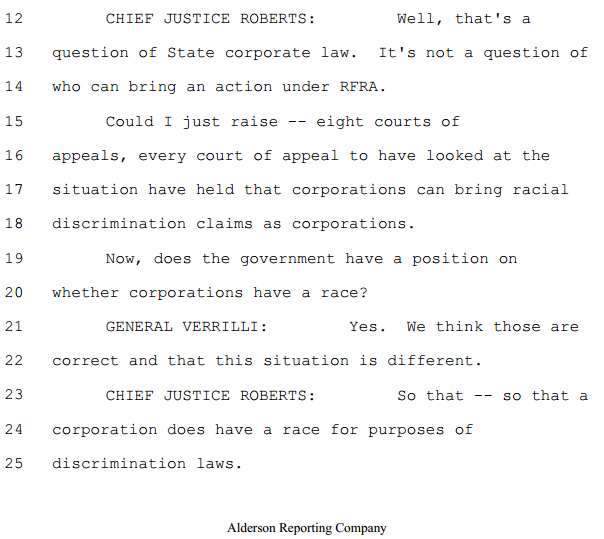
Yesterday morning, the Supreme Court heard oral arguments in the case of Sebelius v. Hobby Lobby Stores, Inc. The case centers around the question of whether companies run by people of faith should be forced to violate their religious beliefs — specifically, whether Hobby Lobby and its owners should be required to provide coverage for several different types of abortifacients or face stiff penalties.
The Obama administration has argued that the government has a greater interest in requiring contraceptive coverage than it does in protecting religious liberty. A full transcript of yesterday’s arguments can be found here.
During the hearing, the Obama administration’s top appellate attorney, Donald Verrilli, and two of the Supreme Court’s most liberal justices made numerous specious arguments in favor of Obamacare’s contraceptive and abortifacient mandate. Here are the six most ridiculous arguments.
1) A Government Surtax On Religious Exercise Is Totally Acceptable
During her questioning of Hobby Lobby’s lead attorney, Justice Sonia Sotomayor appeared to endorse the concept of a religion surtax. Sotomayor’s rationale was that rather than providing health coverage that included abortifacient coverage, companies could refuse outright to provide any health insurance at all, thereby getting around the mandate.
But isn’t there another choice nobody talks about, which is paying the tax, which is a lot less than a penalty and a lot less than — than the cost of health insurance at all? These employers could choose not to give health insurance and pay not that high a penalty – not that high a tax.
Given that the American Revolution started in large part due to a tax on stamps, it seems odd that the Founders would have agreed that citizens should be forced to pay a tax for the privilege of not doing things that might lead to the eternal damnation of their souls. At any rate, Chief Justice John Roberts interjected, and noted that Hobby Lobby’s owners believed they had a religious duty to provide health coverage to their employees. As a result, they would be forced to violate their beliefs no matter what: providing abortifacient coverage would be a violation, as would a failure to provide any health insurance coverage at all.
2) The Mandate Isn’t Really A Mandate
Sotomayor’s endorsement of a religion surtax led directly to the next point, which was made by Justice Elena Kagan. According to Kagan, Obamacare does not say “you must do something that violates your religion”:
It’s giving you a choice. You can do this thing or if this thing violates your religion you can do another thing.
The “other thing,” in her opinion, was to just pay a stiff tax to retain your right to not violate your religious principles.
Justice Nebuchadnezzar could not be reached for comment, but he would surely agree with Kagan’s reasoning. Shadrach, Meshach, and Abednego, after all, weren’t forced to bow down and worship the golden idol constructed by Nebuchadnezzar. He gave them a choice. They could do this thing which violated their religion or they could do another thing. Thankfully, the Supreme Creator intervened on behalf of the three men and issued an injunction that stayed the mandatory furnace penalty.
3) This Is Just A Sneaky Way To Undo The Civil Rights Act
Arguing on behalf of the Obama administration, Solicitor General Donald Verrilli argued that if Hobby Lobby could avoid compliance with the law under the Religious Freedom Restoration Act (RFRA), then there would be no way to prevent a KKK-run company from saying that employing minorities violated its religious beliefs:
[W]ith respect to this issue of whether there are exemptions that defeat a compelling interest, that I submit would be a very dangerous principle for this Court to adopt in the form that my friends on the other side have offered it, because not only would you then be in a position where it would be very hard to see how Title VII [Civil Rights Act employment anti-discrimination] enforcement could be justified by compelling interest in response to a RFRA objection, ADA enforcement, FMLA, all kinds of things.
Justice Ruth Bader Ginsburg was unimpressed by this argument.
“Title VII was passed before 1993, so it wouldn’t apply, she retorted. “RFRA wouldn’t apply to Title VII.”
Nor was Justice Antonin Scalia impressed.
“Except that they passed RFRA after that. That made a lot of sense. But the question is they passed RFRA after that.”
4) Corporations Can Have A Racial Identity, Just Not A Religious One
Corporations are people, my friend, just as long as they’re not religious people. That’s the essence of one argument offered by Verrilli. A major issue in the case is whether a for-profit company or corporation even has standing to sue under RFRA, or whether that right is granted only to individuals or non-profits. The Obama administration has argued that for-profit companies do not have standing. That argument led Roberts to ask the following:

“So the person — the corporation can bring as a person a claim of racial discrimination[?]” Roberts asked.
“That’s correct, but not exercise of religion,” Verrilli replied.
5) Don’t Start A Business If You Want The Government To Respect Your Religious Rights
In response to arguments that the mandate wasn’t really a big deal since the company could just pay a stiff tax to avoid it, Hobby Lobby’s attorney noted that it wasn’t that simple, and that there would be significant negative consequences to the company if it dropped health coverage altogether. The Obama administration’s attorney was unmoved:
[O]nce you make a choice to go into the commercial sphere, which you certainly do when you incorporate as a for-profit corporation, you are making a choice to live by the rules that govern you and your competitors in the commercial sphere.
Basically, if you can’t handle those additional costs incurred as a result of the government taxing you for adhering to certain religious beliefs, oh well.
6) Abortifacients Aren’t Really Abortifacients
The most bizarre argument offered by Verrilli was that Hobby Lobby shouldn’t really care about being forced to pay for abortifacients since some people don’t think life begins at conception. If you just arbitrarily decided when life begins — for example, by declaring that it begins at implantation rather than conception — then you can also declare that an abortion can’t happen up until that point.
Roberts teed up Verrilli’s argument when he said, “One of the religious beliefs is that they have to pay for these four methods of contraception that they believe provide abortions. I thought that’s what we had before us.”
Verrilli disagreed:
It is their sincere belief and we don’t question that. But I will say, and I do think this is important and I say it with all respect, that that is how they that is the judgment that they make. It is not the judgment that Federal law or State law reflects. Federal law and State law which does which do preclude funding for abortions don’t consider these particular forms of contraception to be abortion.
In short, since there’s no law stating that life begins at conception, it’s kind of ridiculous for anyone to believe and act as though life begins at conception.









